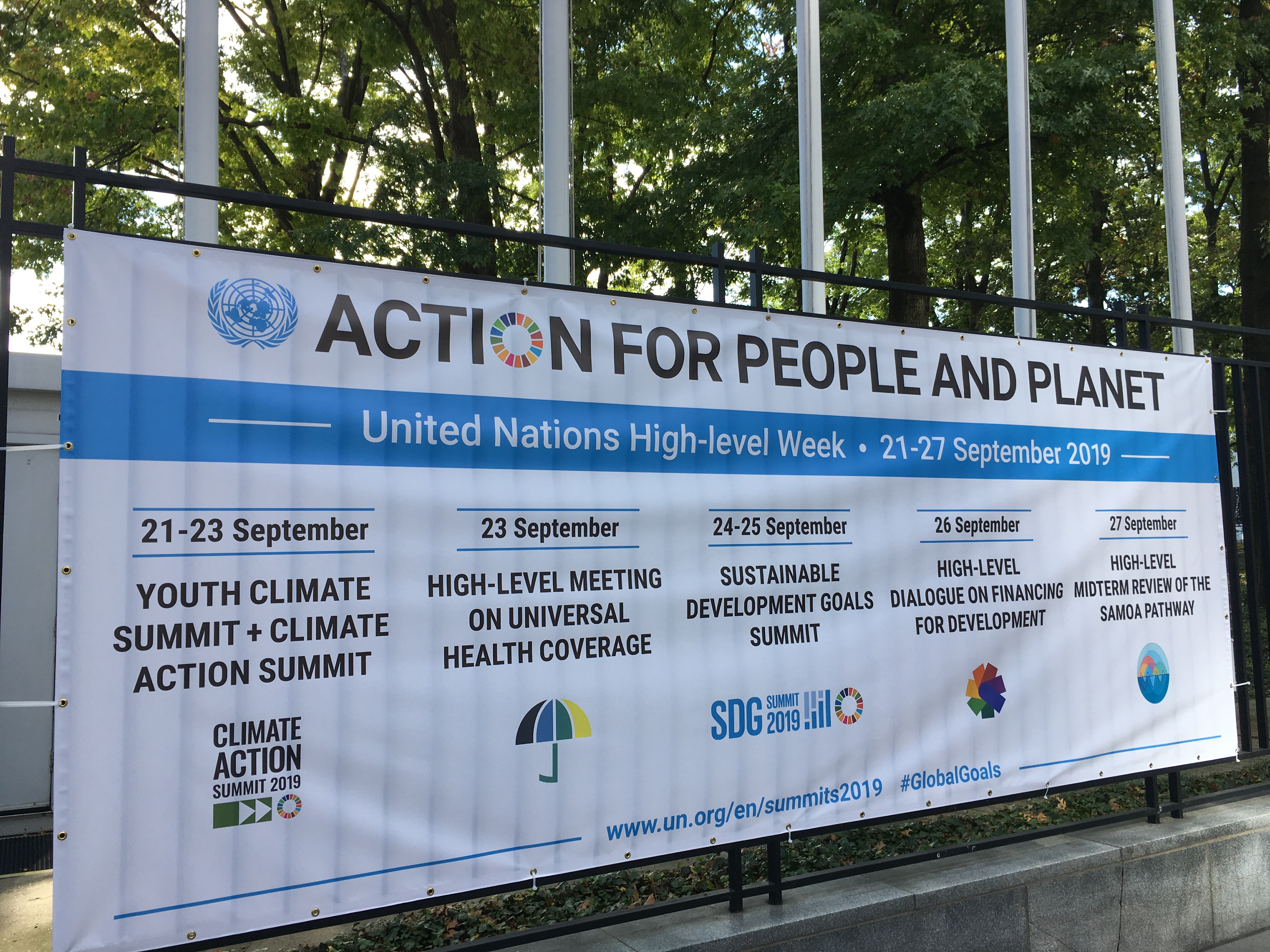[Activity Report] United Nations Approves Political Declaration at the UN High-Level Meeting on UHC (September 23, 2019)
date : 10/11/2019
![[Activity Report] United Nations Approves Political Declaration at the UN High-Level Meeting on UHC (September 23, 2019)](https://hgpi.org/en/wp-content/uploads/sites/2/Shinzo-Abe_UHCHLM-e1570774369327.jpg)
On September 23rd, 2019, the United Nations (UN) held the high-level meeting on Universal Health Coverage (UHC) during the 74th session of the UN General Assembly. The theme of this meeting was “Universal Health Coverage: Moving Together to Build a Healthier World”. The UHC Political Declaration was approved* by UN member states. The “2019 Global Monitoring Report” on measuring the progress of UHC initiatives and the “Global Action Plan for Healthy Lives and Well-being for All” on more effective and efficient collaboration on global health among international organizations were published in accordance with the UN General Assembly.
UHC aims for “people and communities can use the promotive, preventive, curative, rehabilitative and palliative health services they need, of sufficient quality to be effective, while also ensuring that the use of these services does not expose the user to financial hardship”, and is included in the 2030 Sustainable Development Goals (SDGs).
The UHC Political Declaration aims to strengthen health finance, promote primary health care (PHC), take measures against infectious and non-communicable diseases (NCD) including antimicrobial resistance (AMR) and mental health, and improve water, sanitation, and nutrition. In addition, various themes such as the promotion of health education and training of health personnel were included. For NCDs, policy legislation on financial measures to minimize the impact of risk factors, promotion and implementation of regulatory measures, and national policies in line with healthy eating and lifestyles were indicated as important.
The plenary meeting was attended by Prime Minister Shinzo Abe, President of the 74th Session of the United Nations General Assembly Mohammed Bande, World Health Organization (WHO) Director-General Tedros Adhanom, Bill & Melinda Gates Foundation Co-Chair Melinda Gates and others. Prime Minister Abe stated, “In 1961, Japan introduced the universal health insurance system and achieved UHC, which has supported Japan’s socio-economic development and achieved healthy longevity. Rooted in this experience, Japan has widely appealed the importance of UHC to the world. ”, and also that Japan “introduced UHC as one of the agenda items at the G20 Osaka Summit and Africa Development Conference (TICAD7) this year”. In addition to health, Prime Minister Abe emphasized the importance of promoting cross-sectoral efforts such as nutrition, water and sanitation, as well as strengthening health finances.
During the multi-stakeholder side-event held concurrently with this meeting, representatives of international organizations such as UN Secretary-General António Guterres and President of the World Bank Group David Malpass, and representatives of civil societies from around the world, including Oxfam and UHC2030, attended. Panel 1 “UHC as a Driver of Equity, Inclusive Development and Prosperity for All” and panel 2 “Accelerating Multi-Sectoral and Multi-Stakeholder Action and Investments for Achieving UHC” were held. The WHO Goodwill Ambassador for UHC and a member of the House of Councillors, Keizo Takemi participated in panel 2 and addressed, “Japan has for long identified UHC as a diplomatic issue, and this political declaration has highlighted the significance of UHC in achieving the ultimate goal of health”.
At the 75th United Nations General Assembly (2020-2021), the UN Secretary-General will report on the progress towards achieving UHC, as well as make recommendations for implementing the UHC Political Declaration for each country, as requested by the leaders of member states. In addition, it was agreed upon that a second UHC high level meeting will be held during the 78th UN General Assembly (2023-2024).
■2019 Global Monitoring Report
The “2019 Global Monitoring Report” was published by WHO, the United Nations Children’s Fund (UNICEF), the World Bank, the United Nations Population Fund (UNFPA), and the Organization for Economic Cooperation and Development (OECD). This report discussed progress reports using tracer-indicators to measure health-related items in SDG3, data submission and maintenance, and analytical issues regarding measures against NCDs.
■Global Action Plan for Healthy Lives and Well-being for All
“Global Action Plan for the Well-being of All” was published by 12 international organizations involved in global health (Gavi, Global Fund, GFF, UNAIDS, UNDP, UNFPA, UNICEF, Unitaid, UN Women, WFP, WHO, World Bank). This Global Action Plan is an effort to support countries in effectively and efficiently progressing health-related SDGs. The following seven accelerators and the direction of regional-level efforts have been established.
- Primary Health Care
- Sustainable Financing for Health
- Community and Civil Society Engagement
- Determinants of Health
- Innovative Programming in Fragile and Vulnerable States and for Disease Outbreak Response)
- Research and Development, Innovation and Access
- Data and Digital Health
*Revision: UHC Political Declaration is approved on 23 September and adopted on 10 October
Top Research & Recommendations Posts
- [Policy Recommendations] The Path to a Sustainable Healthcare System: Three Key Objectives for Public Deliberation (January 22, 2026)
- [Research Report] Perceptions, Knowledge, Actions and Perspectives of Healthcare Organizations in Japan in Relation to Climate Change and Health: A Cross-Sectional Study (November 13, 2025)
- [Research Report] The 2025 Public Opinion Survey on Healthcare in Japan (March 17, 2025)
- [Policy Recommendations] Reshaping Japan’s Immunization Policy for Life Course Coverage and Vaccine Equity: Challenges and Prospects for an Era of Prevention and Health Promotion (April 25, 2025)
- [Research Report] The 2023 Public Opinion Survey on Satisfaction in Healthcare in Japan and Healthcare Applications of Generative AI (January 11, 2024)
- [Research Report] AMR Policy Update #4: Cancer Care and AMR (Part 1)
- [Public Comment Submission] “Assessment Report on Climate Change Impacts in Japan (Draft Overview)” (December 24, 2025)
- [Policy Recommendations] Developing a National Health and Climate Strategy for Japan (June 26, 2024)
- [Research Report] The 2026 Public Opinion Survey on Healthcare in Japan (February 13, 2026)
- [Research Report] The Public Opinion Survey on Child-Rearing in Modern Japan (Final Report) (March 4, 2022)
Featured Posts
-
2026-01-09
[Registration Open] (Hybrid Format) Dementia Project FY2025 Initiative Concluding Symposium “The Future of Dementia Policy Surrounding Families and Others Who Care for People with Dementia” (March 9, 2026)
![[Registration Open] (Hybrid Format) Dementia Project FY2025 Initiative Concluding Symposium “The Future of Dementia Policy Surrounding Families and Others Who Care for People with Dementia” (March 9, 2026)](https://hgpi.org/en/wp-content/uploads/sites/2/dementia-20260309-top.png)
-
2026-02-05
[Registration Open] (Webinar) The 141st HGPI Seminar “Current Status and Future Prospects of Korea’s Obesity Policy: Voices of People with Lived Experience in Policy Promotion” (March 3, 2026)
![[Registration Open] (Webinar) The 141st HGPI Seminar “Current Status and Future Prospects of Korea’s Obesity Policy: Voices of People with Lived Experience in Policy Promotion” (March 3, 2026)](https://hgpi.org/en/wp-content/uploads/sites/2/hs141-top-1.png)






